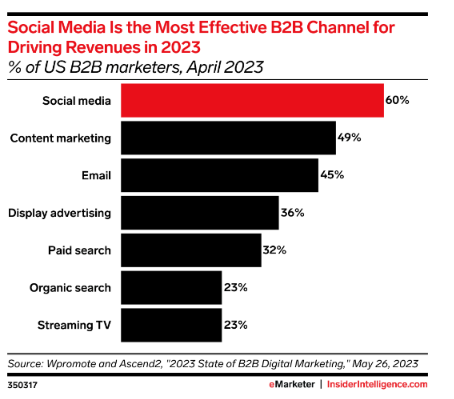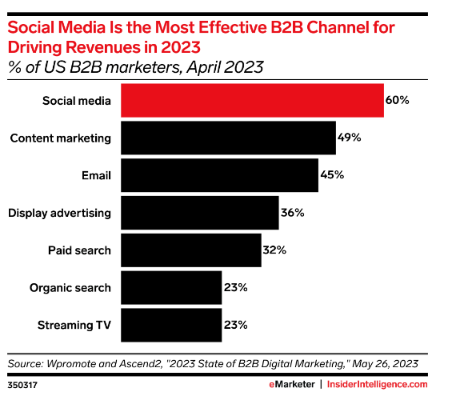The Growing Importance of Social Media in B2B Marketing

By Theresa Meis
From MySpace to Meta, social media has been through more evolutions than a deck of Pokémon. Today’s platforms offer a multimedia-rich ecosystem, ultimately shaping modern digital culture and commerce.
Customer behavior has grown in tandem with these platforms as users vote with their views and clicks. People around the world spend an average of nearly 2.5 hours a day on social media, making it the most effective global marketplace for brands who want to offer their customers a more personalized and interactive experience.
B2B marketers who wish to optimize their social media spend should first invest in understanding the intrinsic link between these platforms and their users. First, let’s take a look at where B2B social media marketing stands today.
The state of B2B social media marketing
2023 saw a 20% increase in social media marketing investment by B2B marketers. And even as paid content distribution decreased overall (a drop of 14% from 2022 to 2023), the vast majority (85%) of those dollars went toward paid social media.
Perhaps the most compelling statistic we’ve found is from Insider Intelligence, which shows that 60% of B2B marketers named social media as the most effective channel for driving revenue.
And businesses aren’t just using social media to market their products and services. McKinsey has identified four primary ways in which brands use social media: monitoring, responding, amplifying, and influencing customer behavior.
That final point, influencing customer behavior, underscores the importance of social media in B2B marketing.
Understanding B2B customer behavior
Understanding your customers as individuals is crucial for building out an effective B2B social media marketing strategy. Modern buyers crave more than just a transaction; they seek a seamless, personalized experience. This involves:
- Multiple channels: Today’s B2B buyers are not just sticking to email or direct sales. They engage with brands through webinars, social media, and even chatbots.
- Convenience: Time is money. Features like one-click reordering, quick customer support, and easily navigable platforms can make or break a deal.
- Personalization: Customization is key. From tailored email marketing to curated product suggestions, giving buyers what they specifically need keeps your brand top of mind.
How social media can influence customer behavior
Influencing buyer behavior hinges on crafting a well-rounded strategy that integrates content and engagement. Your content should be informative, insightful, and relevant to the pain points and needs of your target buyers. It serves as the foundation upon which you establish yourself as a trusted resource and thought leader in your industry.
But content alone is not enough. Engagement is essential to gaining mindshare and building relationships with your audience. This involves actively listening to them, responding to their questions, and participating in conversations. It’s how you humanize your brand, making …read more
Source:: Top Rank Blog








